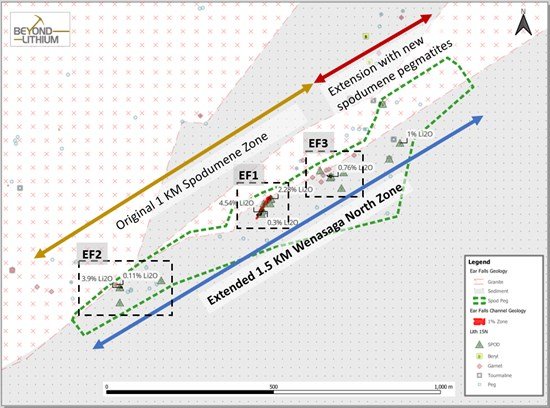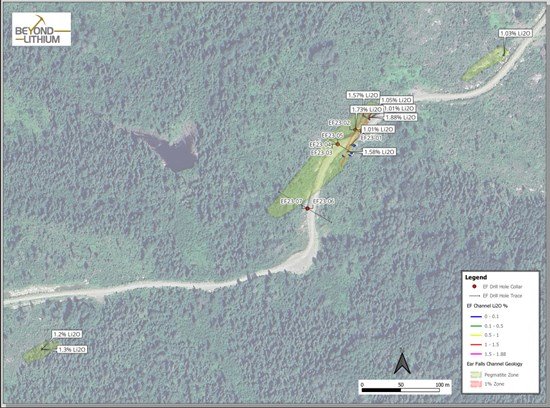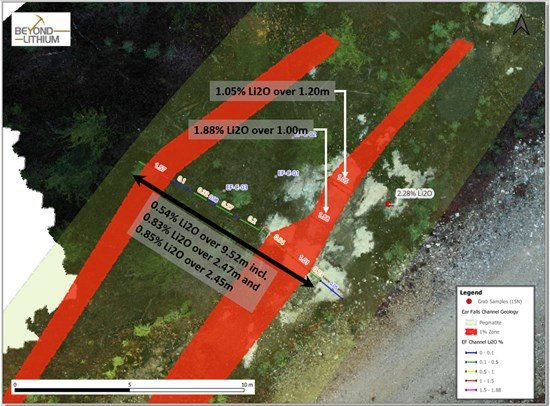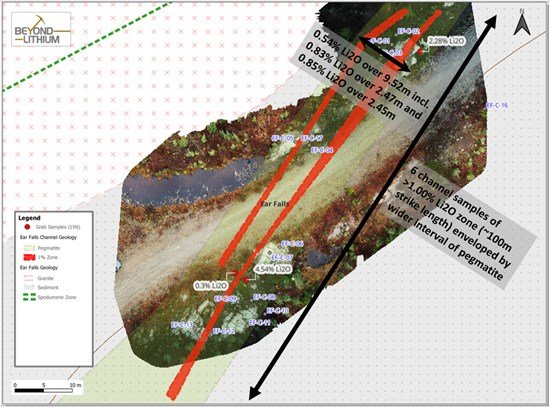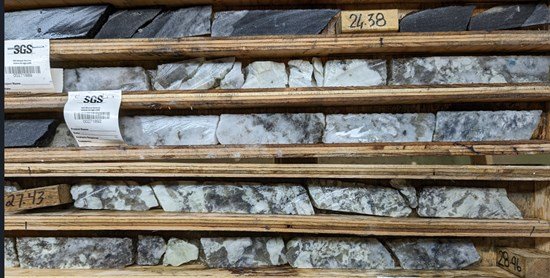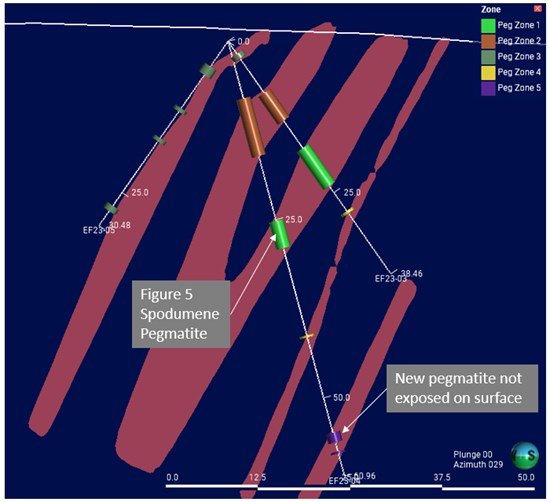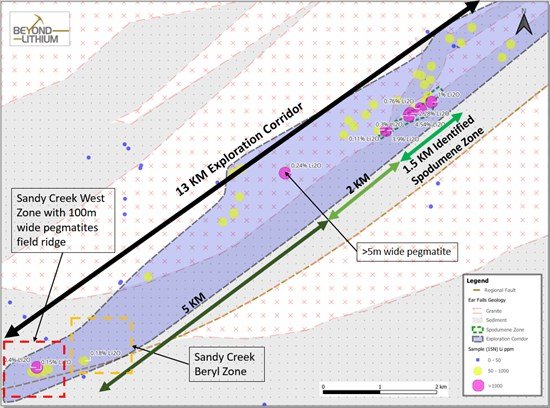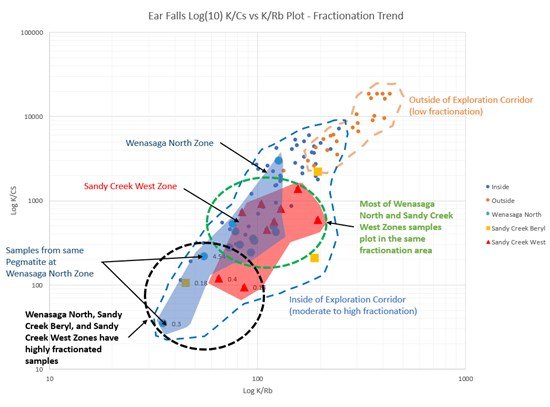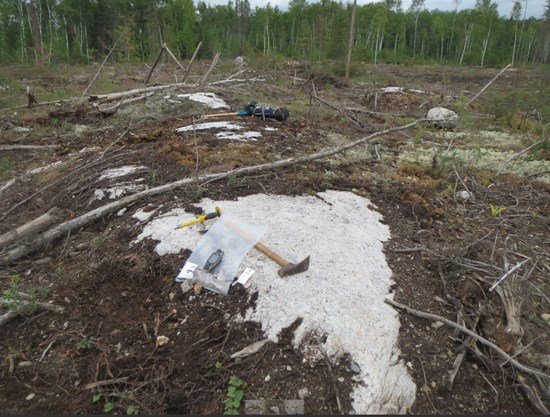- Results of channel samples delineated continuous grades higher than 1.0% Li2O zones enveloped by wider intervals.
- Discovery of additional spodumene-bearing pegmatites extends original spodumene bearing pegmatite zone (the “Wenasaga North Zone“) by 50% (from 1.0 km to 1.5 km).
- Channel samples demonstrate the continuity of the lithium-bearing pegmatites system.
- The Wenasaga North Zone represents only 1.0% of the total Ear Falls project.
Drilling Summary
- Completed seven AQ sized diamond drill holes totalling 329.59m from three different drilling sites testing up to 150 m strike length and 50 m dip continuity of pegmatites.
- Five holes intersected spodumene mineralization, including one dyke not exposed on surface.
- Model for stacked pegmatites system intercepting multiple subparallel spodumene-bearing pegmatites at depth confirmed.
- System remains open to all directions.
- Over 240 drilling samples results expected in the first half of January.
Expansion of 13 km Exploration Corridor Summary
- Discovery of a 100-meter-wide ridge with numerous pegmatite outcrops with grab samples assaying over 0.1% Li2O and up to 0.4% Li2O on the northwest side of the Wenasaga Zone confirms the potential of the 13 km exploration corridor.
- Over 75% of grab samples assayed along the exploration corridor showed elevated background lithium averaging 1,279 ppm Li confirming this extensive strike length.
Beyond Lithium Inc. (CSE: BY) (OTCQB: BYDMF) (the “Company” or “Beyond Lithium“) is pleased to announce the results of a comprehensive exploration program at its Ear Falls spodumene project which confirm the potential of this recent discovery. The work recently completed at Ear Falls consisted of:
- A stripping program designed to expose the extension of the spodumene pegmatites in all-directions and to potentially uncover more subparallel dykes;
- A drilling program targeted to further understand and delineate the characteristics and the densities of these subparallel spodumene pegmatite dykes; and
- An exploration and sampling program along the identified 13 km lithium exploration corridor.
Allan Frame, President and CEO of Beyond Lithium, commented, “Beyond Lithium announced the discovery of the spodumene-bearing pegmatites zone at Ear Falls Project in September (see press release dated September 17, 2023). Grab samples from the area where the initial discovery was made (named the Wenasaga North Zone) assayed up to 4.54 per cent lithium oxide (“Li2O”). Given the promising results announced at the time, our team went back to the property and made significant additional discoveries. We are delighted that, in less than three months of field work, we have completed a prospecting program, a stripping and channel sampling program, and a drilling program and we have extensively sampled new areas.”
He added: “Our field crew continued exploration was based on the geological data we collected from the early field work. They were able to expand the Wenasaga North Zone by over 50% from 1.0 km to 1.5 km by locating additional spodumene-bearing pegmatites. Yet, the footprint of the Wenasaga North Zone accounts for only 1.0% of the total Ear Falls Project size of 20,623 hectares.”
“Concurrently, the field team explored towards the southwest along the 13 km exploration corridor and discovered a 100-meter-wide ridge with numerous pegmatite outcrops with grab samples assaying over 0.1% Li2O and up to 0.4% Li2O. This wider and denser pegmatites field, along with their associated K/Rb ratio (Figure 8) confirm the extensive 13 km strike length of the lithium mineralization all the way to the southwest of the property, an area named the Sandy Creek West Zone.”
Mr. Frame concluded: “We expect to receive all the drilling assays from the lab in the first half of January at which point we will review all the data collected in 2023 and finalize a comprehensive drilling program to begin once permits are received.”
Stripping and Channel Sampling Program
The channel sampling program consisted of a total of 64 channel samples from 15 channel locations ranging from 0.67m to 10.77m. The channel samples were collected from three different zones, EF-1, EF-2 and EF-3, along the Wenasaga North Zone (Figure 1). The stripping and channel sampling program was designed to further understand the grade distribution and continuity in the pegmatites and the host rocks for designing the follow-up exploration program to explore for additional and subparallel spodumene-bearing pegmatites.
Lawrence Tsang, Beyond’s VP of Exploration stated: “We are glad that the prospecting, the stripping and channel sampling, and the drilling program completed at Ear Falls were successful at reaching the programs’ objective which was to gather geological data to understand the characteristics of the Ear Falls system for planning the next exploration program, including drilling.”
“In short, we now understand the Ear Falls Project is a stacked and zoned pegmatites system which includes the potential of discovering additional subparallel dykes by drilling deeper holes and doing more stripping along the different pegmatites. The vectoring of the dykes’ width and grade continuity we have established at Ear Falls from the prospecting program also indicates a great opportunity to explore for wider spodumene-bearing pegmatites towards the Sandy Creek West Zone. In the meantime, we remain on track to submit the exploration permit application for the Ear Falls Project for over 30 drill sites before the end of the week.”
Figure 1 Zones EF1 to EF3 along the Expanded 1.5 KM Spodumene Zone – Wenasaga North Zone
To view an enhanced version of this graphic, please visit:
https://images.newsfilecorp.com/files/8620/191500_77719170346b8b33_002full.jpg
Table 1 Zone EF1 Channel Samples Highlights
| Type | ID | Width (m) | Li2O % | Cs ppm |
| Local individual | EF-C-01 | 1.00 | 1.88 | 77 |
| Local individual | EF-C-02 | 1.20 | 1.05 | 204 |
| Continuous | EF-C-03 | 9.52 | 0.54 | 186 |
| incl. | 2.47 | 0.83 | 168 | |
| incl. | 6.77 | 0.45 | 199 | |
| or | 2.45 | 0.85 | 157 | |
| Continuous | EF-C-05 | 2.09 | 0.58 | 281 |
| incl. | 1.04 | 1.06 | 436 | |
| Local individual | EF-C-09 | 0.70 | 1.58 | 59 |
Table 2 Zones EF2 and EF 3 Channel Samples Highlights
| Type | Zone | ID | Width (m) | Li2O % | Cs ppm |
| Continuous | EF2 | EF-C-14 | 2.00 | 1.25 | 56 |
| Local individual | EF3 | EF-C-15d | 0.20 | 1.03 | 63 |
Figure 2 2023 Channel Locations and Highlights in Relation to the 2023 Drill Holes Locations and Traces – Wenasaga North Zone
To view an enhanced version of this graphic, please visit:
https://images.newsfilecorp.com/files/8620/191500_77719170346b8b33_003full.jpg
The channel samples collected along the initial one-kilometer spodumene-bearing pegmatite trend known as the Wenasaga North Zone were divided into three zones: EF-1, EF-2 and EF-3 (Figure 1). Zone EF-1 primarily tested the initial 150m strike length of the spodumene-bearing pegmatites zone. Channel sampling at zones EF-2 and EF-3 were step-outs samples testing the extent of the one-kilometer long spodumene zone.
Since the spodumene discovery announced in September, Beyond Lithium field crew continued to explore for additional spodumene-bearing pegmatites following the strike orientation of the Ear Falls spodumene-bearing pegmatite system. They were able to locate additional spodumene-bearing pegmatites towards the northeastern extension grading up to 1.00% Li2O and 107ppm Cs in grab sample mineralized with spodumene, muscovite, and fluorapatite. With the recognition of additional spodumene-bearing pegmatites towards the northeast direction, the Wenasaga North Zone at Ear Falls has now been extended by over 50%, from 1.0 km to 1.5 km (Figure 1) at the northeast region of the 13 km exploration corridor.
Zone EF-1
A pegmatite in the northern part of the EF-1 zone was mechanically stripped by a backhoe for a more continuous channel sampling across the spodumene-bearing pegmatite, EF-C-03 (Table 1). This channel graded 0.54% Li2O and 186ppm Cs over 9.52m including 0.83% Li2O and 168ppm Cs over 2.47m and 0.85% Li2O and 157ppm Cs over 2.45m (Figure 3). The spodumene-bearing pegmatite is formed along the contact between the granite and the metasediments with local sliver of older micaceous granite. Generally, the pegmatites strike at 030 to 070 degrees azimuth and dip moderately at 60 to 70 degrees towards the northwest. Based on field observation, the spodumene-bearing pegmatites at Ear Falls are strongly controlled by the orientation of the granite and the metasediments contact.
Lawrence added: “From where we were able to cut a more complete line across the mechanically stripped pegmatite in zone EF-1, the channel samples outlined a couple of continuous higher-grade (greater than 1% Li2O) zones enveloped by wider intervals of pegmatite (Figures 2 & 4). Pegmatite dykes in nature pinch and swell from one area to another. It is significant to have good continuity in grade within a pegmatite zone to better correlate between pegmatites and potentially outline larger zones for future estimation. Furthermore, the stripping and channel sampling program effectively confirmed the strike projection of spodumene-bearing pegmatites exposed at surface along the Wenasaga North Zone. Mechanized stripping is a cost-effective exploration tool, that we will continue to implement in our exploration programs to strip in different zones, and to delineate and prioritize targets for drilling.”
Figure 3 Zone EF1 Channel Samples of Zoned Pegmatite with high-grade core of greater than 1.00% Li2O – Wenasaga North Zone
To view an enhanced version of this graphic, please visit:
https://images.newsfilecorp.com/files/8620/191500_77719170346b8b33_004full.jpg
Figure 4 Greater than 1.00% Li2O Continuous Higher-Grade Zone Enveloped by Wider Interval in Pegmatite – Wenasaga North Zone
To view an enhanced version of this graphic, please visit:
https://images.newsfilecorp.com/files/8620/191500_77719170346b8b33_005full.jpg
Zone EF-2 & EF-3
The channel sampling at Zones EF-2 and EF-3 were designed to test the step out zones from the EF-1 zone (Figure 1). Both EF-2 and EF-3 zones have channel samples with grades over 1.0% Li2O consistent with the results from the Phase 1 grab samples in the same areas. EF-2 channel sample assayed 1.25% Li2O over 2.0m (Table 2). The channel sampling at the zones at EF-2 and EF-3 was hand stripped and cut by a rock saw instead of mechanized stripped due to time and weather constraints. When weather permits, Beyond Lithium will resume mechanized stripping and prospecting programs at Ear Falls.
Drilling Program Summary
In November 2023, Beyond Lithium completed seven AQ sized drill holes totaling 329.59 m from three drill sites. This program was designed to drill test 150 meters strike length of the spodumene-bearing pegmatites zone and up to 50m dip continuity below surface (Figure 2). The first five holes, EF23-01 to 05, were drilled towards the southeast targeting below the surface exposed spodumene-bearing pegmatites. All five holes intercepted spodumene-bearing pegmatites mineralization at depth projected from the surface exposed pegmatites (Figure 5). Hole EF23-04 intercepted a new subparallel pegmatite (Peg Zone 5) at depth which is not exposed on surface. This suggests the possibility of intercepting more pegmatites at depth from longer drill holes (Figure 6).
Figure 5 EF23-04 Drill Core Pic of Spodumene-bearing Pegmatite Intercepted at 25.16m at depth – Wenasaga North Zone
To view an enhanced version of this graphic, please visit:
https://images.newsfilecorp.com/files/8620/191500_77719170346b8b33_006full.jpg
Graeme Evans, Senior Advisor to Beyond Lithium, remarked: “In 2023 early-stage work has defined a thirteen-kilometre trend with high prospectivity along the entire length. I was expecting zonation to limit the strike potential but clearly not here! This sets up an ambitious 2024 season to outline higher grades and widths in this large brand new LCT system. We keep mentioning these targets are at an early stage but we haven’t even looked at 1.0% of the system so do the math!”
The first five holes confirmed that the Ear Falls structure is a stacked pegmatites system and have successfully tested up to 50m dip continuity. All pegmatites remain open in all directions. The last two holes, EF23-06 to 07 were exploratory and step-out holes attempting to extend the strike length of the system at depth. EF23-06 was mainly hosted in metasediment. EF23-07 was drilled in the opposite direction and relocated the pegmatites at depth along strike showing good continuity. Over 240 drilling samples are currently pending in the lab and are expected to be announced in the first half of January.
Figure 6 Cross Section Pegmatite Zone Interpretation from Drilling at Ear Falls – Wenasaga North Zone
To view an enhanced version of this graphic, please visit:
https://images.newsfilecorp.com/files/8620/191500_77719170346b8b33_007full.jpg
Lawrence Tsang commented: “This initial drilling program at Ear Falls demonstrated the pegmatites have good strike and dip continuities. In addition, the system remains open in all directions. The drilling has shown the potential to uncover more subparallel pegmatites at depth. In other words, more pegmatites are potentially covered by vegetation or overburden which can only be discovered by stripping or drilling. The Wenasaga North Zone discovery provided us with a starting point for exploration drilling at Ear Falls. The combination of wider and denser pegmatites with lithium mineralization in the Sandy Creek West Zone and the geological data collected from the prospecting and the channel sampling programs in the Wenasaga North Zone establishes a strong vector towards the Sandy Creek West Zone for further follow up exploration at Ear Falls.”
Extension of 13 km Exploration Corridor
“When we announced the initial spodumene discovery at Ear Falls, we mentioned the Sandy Creek beryl-bearing pegmatites that were discovered in the early 1960s (located seven kilometres southwest of the Wenasaga North Zone) and the fact that very limited to no exploration work was done in the area since the discovery of these pegmatites over 60 years ago,” said Lawrence Tsang.
“Beyond Lithium recognized this area to be favourable for LCT pegmatites because of the well-established Wenasaga Lake batholith as the potential source of LCT pegmatites of the area and the higher fractionated Sandy Creek beryl occurrence in the area. The Sandy Creek Beryl area then became a major focus of exploration for our technical team which led to the discovery of a 100-meter-wide ridge with numerous pegmatite outcrops with grab samples assaying over 0.1% Li2O and up to 0.4% Li2O, now known as the Sandy Creek West Zone.”
To date, a total of 92 grab samples have been collected at Ear Falls and 70 of them were collected along the main 13 km long exploration. Out of the 70 samples, over 75% of the grab samples (55 out of 70) assayed over 50 ppm Li with an average of 1,279 ppm Li or 170 ppm Li (without outliers of >1,000 ppm Li) and the samples outside of the corridor averaged 26.5 ppm Li (Figure 7).
This background lithium contrast from grab samples between inside and out of the 13 km exploration corridor further confirms the extent and the orientation of this 13 km strike length. It suggests the rare-element lithium volatiles/fluid concentrated and fractionated within this prospective structure acting as a permeable and favorable conduit for lithium-indicator minerals like spodumene, cleavelandite, and petalite identified in the completed drilling program to mineralize.
Figure 7 13 KM Exploration Corridor in Relation with the Sandy Creek West Zone and the Expanded Spodumene Zone
To view an enhanced version of this graphic, please visit:
https://images.newsfilecorp.com/files/8620/191500_77719170346b8b33_008full.jpg
Based on the preliminary findings from the field, the pegmatites at Ear Falls trend wider and denser towards the southwest orientation. A grab sample from pegmatite of over 5 meters in width located two kilometers southwest of the Wenasaga North Zone assayed up to 0.24% Li2O. The Sandy Creek West Zone located about seven kilometers southwest of the Wenasaga North Zone included three grab samples assaying over 0.10% Li2O and up to 0.40% Li2O (Figure 7).
The Sandy Creek West Zone is located on a ridge that was uncovered after a recent clear cut in the area. As pegmatites are more resistant to erosion, this topographic high landscape was quickly located by our Senior Geologist, Paul Baxter, after Beyond Lithium expanded the Ear Falls Project in September. The Sandy Creek West Zone trends east-west and covers an area of about 350 meters in length by 100 meters in width in an area with numerous of pegmatites exposed on surface ranging from 2 to 15 m in width.
Figure 8 Log base 10 K/Cs Vs K/Rb Plot of Fractionation Intensity of Ear Falls Samples
To view an enhanced version of this graphic, please visit:
https://images.newsfilecorp.com/files/8620/191500_77719170346b8b33_009full.jpg
Measuring the ratio variations between potassium (“K”), cesium (“Cs”), rubidium (“Rb”) in samples collected from the same region is a common and useful exploration tool to display the fractionation trend or the relative degree of evolution of S-type, peraluminous granites and related pegmatite granites and the rare-element pegmatite groups that fractionated from the parent granitic rocks. With increasing fractionation of the pegmatite-forming melt, the compositions of the potassium feldspar and mica become more enriched in rubidium and cesium thus the fractionation trend point to the lower left corner in the plot as the higher fractionated area (Breaks 2004).
The fractionation intensity plot of all the samples collected to date at Ear Falls clearly distinguished into two groups: the samples within the 13 km exploration corridor and the samples from outside the exploration corridor. The samples within the 13 km exploration corridor were plotted higher in fractionation intensity than the samples from outside the exploration corridor (Figure 8). Furthermore, both populations of samples collected from the Wenasaga North and the Sandy Creek West Zones were plotted in the same area of fractionation intensity in the plot which suggests both zones are equally fractionated. In other words, the potential of discovering spodumene-bearing pegmatites at the Sandy Creek West Zone is equally as high as the Wenasaga North Zone where several spodumene-bearing pegmatites had been discovered.
Also, two grab samples from the same pegmatite at the Wenasaga North Zone assaying 0.30 and 4.54% Li2O were plotted as the highest fractionated samples along with a few samples collected form the Sandy Creek Beryl and the Sandy Creek West Zones assaying around 0.13 to 0.40% Li2O (Figure 8). The pegmatites associated with these few samples at the Sandy Creek Beryl and the Sandy Creek West Zones will be prioritized in the next exploration program as these pegmatites are highly fractionated and have the higher potential to finding nearby spodumene mineralization.
Paul Baxter, Beyond Lithium‘s Senior Field Geologist highlighted the significance of this newly discovered zone: “A stripping program will be useful to determine the true width of the pegmatites in the Sandy Creek West Zone to see if the ridge is essentially one large pegmatite (Figure 9).”
He added: “The pegmatites in the Sandy Creek West Zone are characterized with quartz, feldspar, muscovite, garnet, and local beryl, fluorapatite and tourmaline with common quartz pods and large sheets of muscovite. The field team collected a total of nine samples from the Sandy Creek West Zone. The results show great lithium mineralization in the area with potential proximal spodumene mineralization. It is probably just a matter of spending more time in the field time and collecting more samples at the Sandy Creek West Zone before we discover the next spodumene-bearing pegmatite at Ear Falls.”
Figure 9 Pegmatite Identified in the Sandy Creek West Zone Located 7 KM SW of the Wenasaga North Zone with Grab Sample up to 0.40% Li2O
To view an enhanced version of this graphic, please visit:
https://images.newsfilecorp.com/files/8620/191500_77719170346b8b33_010full.jpg
The Ear Falls Project is comprised of over 20,000 hectares of area and the footprint of the 13 km long exploration corridor only accounts for 10% of the total surface area of the Ear Falls Project. Beyond Lithium will continue to explore for additional of spodumene-bearing pegmatites along the 13 km long exploration corridor and at the same time will prospect for other subparallel structures across the project by incorporating the geological and geochemical background established from the 2023 program.
Victor Cantore, a Co-Founder of Beyond Lithium concluded: “I couldn’t be prouder of the progress made by the entire Beyond Lithium team in 2023. The company is uniquely positioned with two significant spodumene discoveries right by some of the industry’s most attractive infrastructure. The size of the projects and their potential could lead Beyond to become one of the key lithium players in Canada. I will continue to support our CEO Allan Frame and his entire team in any way needed. My shares of Beyond are a key part of my lithium stock portfolio.”
Sources
Breaks, F.W., Selway, J.B. and Tindle, A.G. 2003. Fertile peraluminous granites and related rare-element mineralization in pegmatites, Superior Province, northwest and northeast Ontario: Operation Treasure Hunt; Ontario Geological Survey, Open File Report 6099, 179p.
Breaks, F.W., Selway, J.B. and Tindle, A.G. 2004. A Review of Rare-Element (Li-Cs-Ta) Pegmatite Exploration Techniques for the Superior Province, Canada, and Large Worldwide Tantalum Deposits; Ontario Geological Survey, Exploration and Mining Geology, Vol. 14, Nos. 1-4, pp. 1-30.
Channel samples were collected by using a rock saw to cut one to multiple of continuous samples along an exposed outcrop based on lithology, texture, and mineralogy. Some of the channel samples were continuous sampling across exposed outcrop labeled as “Continuous” and some of them were localized channel samples that were covered by thicker soil, moss, and vegetation labeled as “Local individual” in the channel samples highlight tables.
Quality Assurance/Quality Control
All collected rock samples were put in sturdy plastic bags, tagged, and sealed at site. Sample bags were then put in rice bags and kept securely before being sent by road transport or delivered by the crew supervisor to SGS’s preparation facility in Red Lake or Sudbury, Ontario, for sample preparation. Pulps are analyzed at the SGS facility in Burnaby, BC. All samples are analyzed with Four-Acid Digestion/Combined ICP-AES/MS package (49 elements). Samples with lithium overlimit (>10,000 ppm Li) are analyzed with another Four-Acid Digestion with higher detection limit of up to 10% Li. Batches of samples with overlimit >10,000 ppm or 1% Li are analyzed with Sodium Peroxide Fusion for validation. The QA/QC protocol included the insertion and monitoring of appropriate reference materials, in this case high concentration and low concentration certified OREAS and CDN lithium standards to validate the accuracy and precision of the assay results.
Qualified Person and Third-Party Data
The scientific and technical information in this news release has been reviewed and approved by Lawrence Tsang, P.Geo., VP Exploration of the Company. Lawrence Tsang is a “qualified person” as defined in National Instrument 43-101 – Standards of Disclosure for Mineral Projects.
About Beyond Lithium Inc.
Beyond Lithium Inc. is the largest greenfield lithium exploration player in Ontario with 63 high potential greenfield lithium properties totalling over 195,000 hectares. The Company has adopted the project generator business model to maximize funds available for exploration projects, while minimizing shareholder dilution. Beyond Lithium is advancing certain of its projects with its exploration team and will seek to option other properties to joint venture partners. Partnering on various projects will provide a source of non-dilutive working capital, partner-funded exploration, and long-term residual exposure to exploration success.
Beyond Lithium currently has 33,874,482 common shares outstanding.
Please follow @BeyondLithium on Twitter, Facebook, LinkedIn, Instagram and YouTube.
For more information, please refer to the Company’s website at www.beyondLithium.ca
CAUTIONARY STATEMENT REGARDING FORWARD-LOOKING INFORMATION: This news release includes certain “forward-looking information” within the meaning of applicable Canadian securities legislation. All statements, other than statements of historical fact, included herein including, without limitation, statements regarding future capital expenditures, anticipated content, commencement, and cost of exploration programs in respect of the Company’s projects and mineral properties, anticipated exploration program results from exploration activities, resources and/or reserves on the Company’s projects and mineral properties, and the anticipated business plans and timing of future activities of the Company, are forward-looking information. Although the Company believes that such statements are reasonable, it can give no assurance that such expectations will prove to be correct. Often, but not always, forward-looking information can be identified by words such as “pro forma”, “plans”, “expects”, “will”, “may”, “should”, “budget”, “scheduled”, “estimates”, “forecasts”, “intends”, “anticipates”, “believes”, “potential” or variations of such words including negative variations thereof, and phrases that refer to certain actions, events or results that may, could, would, might or will occur or be taken or achieved. In stating the forward-looking information in this news release, the Company has applied several material assumptions, including without limitation, that market fundamentals will result in sustained precious and base metals demand and prices, the receipt of any necessary permits, licenses and regulatory approvals in connection with the future exploration of the Company’s properties, the availability of financing on suitable terms, and the Company’s ability to comply with environmental, health and safety laws.
Forward-looking information involves known and unknown risks, uncertainties and other factors which may cause the actual results, performance or achievements of the Company to differ materially from any future results, performance or achievements expressed or implied by the statements of forward-looking information. Such risks and other factors include, among others, statements as to the anticipated business plans and timing of future activities of the Company, the proposed expenditures for exploration work on its properties, the ability of the Company to obtain sufficient financing to fund its business activities and plans, delays in obtaining governmental and regulatory approvals (including of the Canadian Securities Exchange), permits or financing, changes in laws, regulations and policies affecting mining operations, risks relating to epidemics or pandemics such as COVID-19, the Company’s limited operating history, currency fluctuations, title disputes or claims, environmental issues and liabilities, as well as those factors discussed under the heading “Risk Factors” in the Company’s prospectus dated February 23, 2022 and other filings of the Company with the Canadian securities regulatory authorities, copies of which can be found under the Company’s profile on the SEDAR website at www.sedarplus.ca.
Readers are cautioned not to place undue reliance on forward-looking information. The Company undertakes no obligation to update any of the forward-looking information in this news release except as otherwise required by law.
For further information, please contact:
Allan Frame
President and CEO
Tel: 403-470-8450
Email: allan.frame@beyondLithium.ca
Jason Frame
Manager of Communications
Tel: 587-225-2599
Email: jason.frame@beyondLithium.ca

To view the source version of this press release, please visit https://www.newsfilecorp.com/release/191500



